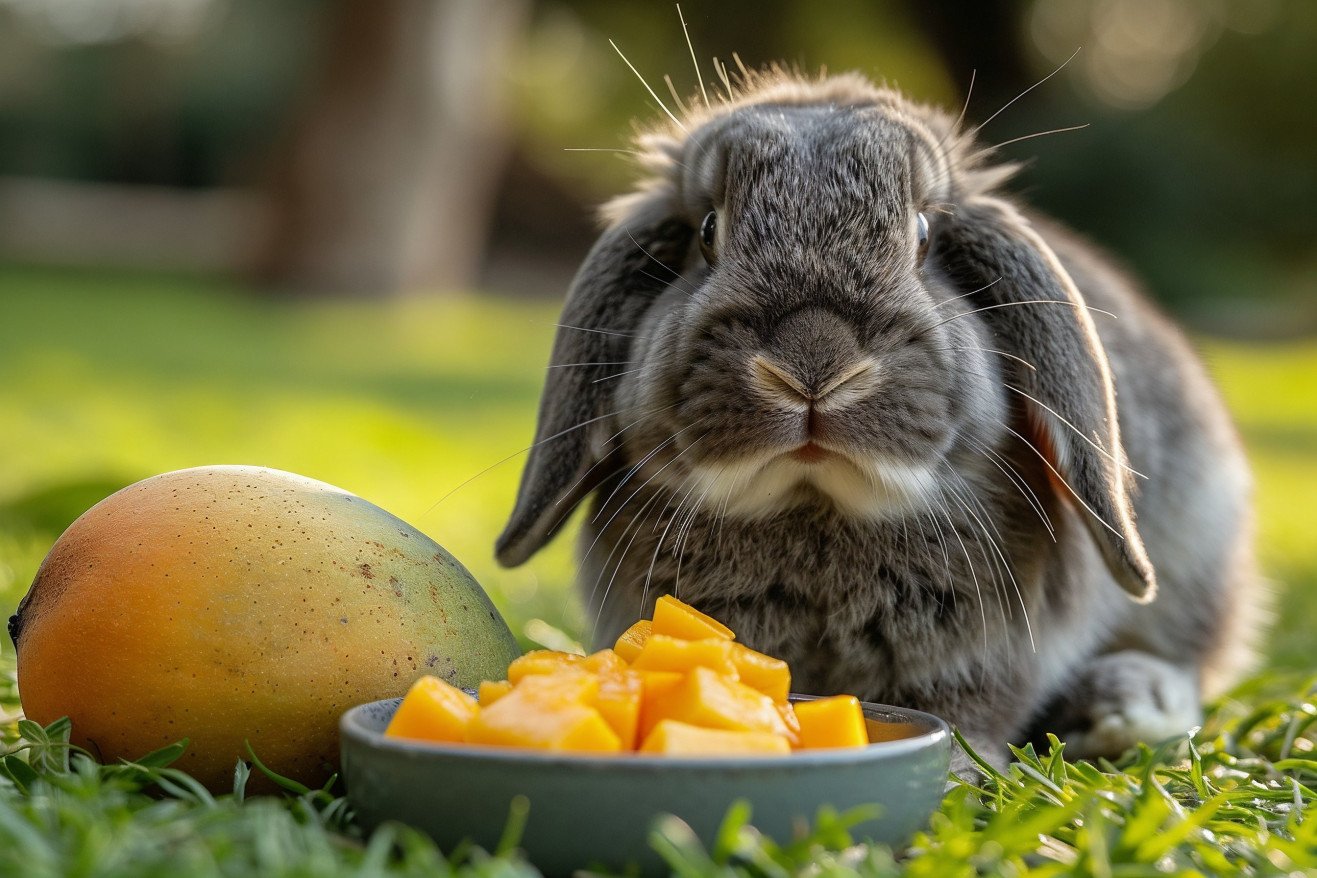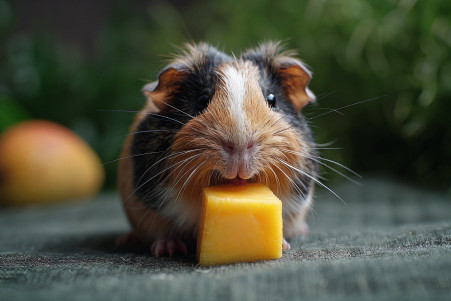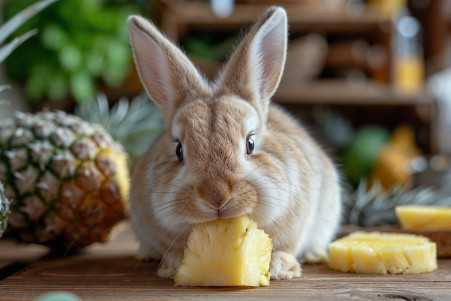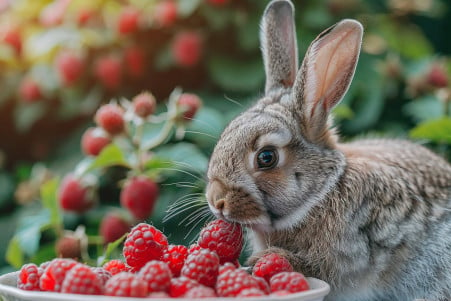Can Rabbits Eat Mango? A Guide to Safe Fruity Treats
2 February 2024

Mangoes, a delicious tropical fruit, make many pet owners wonder if their furry friends can enjoy them too. While rabbits can eat mangoes, they should only be given as an occasional treat. This is because mangoes are high in sugar, and too much sugar can lead to health problems.
That said, when given as a treat, mangoes should be cut into small, seedless pieces and offered in small amounts, especially when compared to the hay, leafy greens, and pellets that should make up the bulk of a rabbit’s diet.
This article will use veterinary and nutritional research to provide a complete overview of what rabbits should eat. It will then delve into what it means to feed rabbits fruits like mangoes, including the potential benefits and risks. Finally, it will cover how a rabbit’s digestive system works and how it handles sugar, so you can better understand the treats you give your pet rabbit.
Can rabbits eat mango?
Nutritional Facts of Mangoes for Rabbits
Mangoes are a good source of dietary fiber, vitamins, and antioxidants for rabbits, and despite the potential downsides of their sugar content and sweet taste, they can be a healthy addition to a rabbit’s diet. A study on PMC shows that mangoes are high in vitamin C, dietary fiber, and antioxidants like quercetin and kaempferol, which can help support good health and improve lipid profiles.
Meanwhile, a report on ScienceDirect explains that mangoes are rich in vitamins A and C and omega-3 and omega-6 fatty acids, all of which are important for eye health and a strong immune system.
That said, the sugar in mangoes is a major drawback for rabbits and can lead to obesity and dental issues if consumed in large amounts. This is confirmed by PMC, which notes that the natural sugars in mangoes mean they should be fed in moderation.
When feeding mangoes to rabbits, it’s important to take these nutritional facts into account. Rabbits have specific dietary needs, and while they can eat mangoes as a treat, it should be in a way that doesn’t upset their diet or digestive system. This means that owners can take advantage of the nutritional benefits of mangoes for rabbits while minimizing the downsides of their sugar content.
How to Balance Your Rabbit’s Diet: Essentials and Treats
Of course, it’s important to know what rabbits can eat so that you can ensure their diet is healthy and balanced.
Since rabbits are herbivores and grazers, their diet should consist of a combination of hay, fresh vegetables, and specially formulated pellets, which are especially high in fiber.
According to VCA Animal Hospitals, hay is not only a staple food but also important for dental health, as it helps keep a rabbit’s teeth worn down. The RSPCA agrees, noting that rabbit owners should always make sure that good quality hay and/or grass is available and that it should make up the majority of a rabbit’s diet.
On the other hand, treats are meant to supplement a rabbit’s diet, and while they can help keep things interesting for your pet, they can also lead to health problems if they are over-consumed.
For example, the Merck Veterinary Manual points out that fruits like mangoes are high in sugar, so they should be fed in moderation. This is in line with the RSPCA’s recommendation to feed root vegetables and fruit in small amounts as treats.
If you do decide to feed your rabbit mango or another treat, it’s important to introduce it to their diet slowly. This way you can start with a small amount and see how your rabbit reacts. This will help you make sure that your rabbit can tolerate the fruit and that it won’t cause any digestive upset.
By following these guidelines, you can enjoy sharing a slice of mango with your rabbit without worrying that you are putting their health at risk.
A Look at Rabbit Digestion
Rabbit digestion has been honed by evolution to be especially good at breaking down fibrous plant material. As Veterinary Clinics: Exotic Animal Practice explained, rabbits are natural folivores that are meant to eat nutrient-rich, leafy greens.
Their fast metabolism means that they need a diet that is high in digestible and highly fermentable matter. The rabbit’s large cecum, which is similar to a cow’s rumen, contains bacteria that are specifically designed to break down fiber, according to Purina Animal Nutrition.
This fermentation chamber is important because fiber is the foundation of the rabbit’s diet and the main source of energy. However, the addition of sugary foods like mango can throw this system out of whack. Not only does the sugar put the rabbit at risk for obesity, it can also change the important bacteria in the cecum, which can cause digestive upset.
In addition, rabbits practice coprophagy, which means that they eat special soft fecal pellets called cecotrophs, to make sure that they get all of the nutrients that they can from their fiber-rich diet.
This shows that it’s important to make sure that they are getting the right balance of nutrients. So while rabbits may like the taste of mango, it’s important to make sure that the fruit isn’t taking the place of fiber-rich foods that are important for their digestion.
Knowing the Bitter Truth: The Impact of Sugar on Rabbit Health
As tempting as the natural sweetness of mangoes may be, the sugar they contain can have serious health implications. Due to their low-calorie requirements, rabbits are prone to weight gain and obesity when they consume high-sugar foods, including natural fruits. According to rabbit medicine specialist Frances Harcourt-Brown, while fruits are not toxic, they can lead to obesity and an unbalanced diet in rabbits.
A study published in PMC also cites dental problems as a potential issue, linking a high-sugar diet to an increased risk of dental disease in rabbits, which is a common problem that can affect their welfare. In addition, feeding rabbits sugary foods can lead to gastrointestinal issues. Although not all experts agree, some research has suggested that high-sugar diets may be linked to conditions like enterotoxaemia, particularly in young rabbits with immature caecal microflora.
To help reduce these risks, rabbit owners should control portion sizes and the frequency with which they feed their pets sugary foods like mangoes. Rabbit owners can also help ensure their pet’s well-being by balancing the sugar content with the nutritional value of the food and the protective benefits of high-fiber foods against dental disease.
This means focusing on more than just sugar reduction and instead prioritizing a healthy, fiber-rich diet that mimics a rabbit’s natural eating habits.
Safe and Sweet: How to Give Mango to Your Rabbit
When feeding your rabbit mango, it’s important to do so in moderation and with caution. According to The Spruce Pets, fruit should only make up a small part of your rabbit’s diet, no more than two percent.
Therefore, when you first introduce mango to your rabbit, give them a small piece to see how their digestive system reacts. If they don’t have any issues, like a decrease in activity or loose stool, you can slowly increase the amount you give them.
To help maintain a balanced diet and prevent weight gain, Rabbit Care Tips suggests keeping the amount of mango you give your rabbit small and only feeding it to them once or twice a week. Also, make sure to cut the mango into small pieces and remove the seed and skin. Rabbits Life notes that a piece the size of a thumbnail is a good portion for one serving.
After you introduce mango or any new food to your rabbit, make sure to watch them closely for any adverse reactions. This includes changes in their behavior or stool that could indicate digestive issues. To keep things interesting, you can also rotate mango with other rabbit-friendly fruits, like apple slices (without seeds), blueberries, or pieces of pear, making sure to keep the portions small.
By following these tips, you can make sure that you’re feeding your rabbit mango safely and in a way that will keep them healthy.
In Conclusion: Can Rabbits Eat Mango?
As discussed in this article, mangoes can be a tasty addition to a rabbit’s diet, but they should be fed in moderation. A study posted in PMC explains that mangoes are a good source of important nutrients like dietary fiber, vitamins, and antioxidants, which can have a positive impact on health when eaten in the right way.
However, their sugar content means that care must be taken to avoid potential health problems like obesity and dental trouble, as noted in several studies in ScienceDirect and PMC.
Part of being a good pet owner is making sure that you’re making informed decisions about what you feed your pets. For rabbit lovers, this means that you need to think about the nutritional value of treats like mangoes and weigh them against the potential downsides.
By feeding mangoes in moderation and paying attention to how your rabbit responds, you can make sure that your rabbit has a well-rounded diet that doesn’t put their health in danger.
So, while mangoes can be part of a rabbit’s diet, they should be introduced slowly and fed in limited quantities. Try to find a balance between giving your pets what they want and what’s best for them so that you can help them live long, healthy lives.


